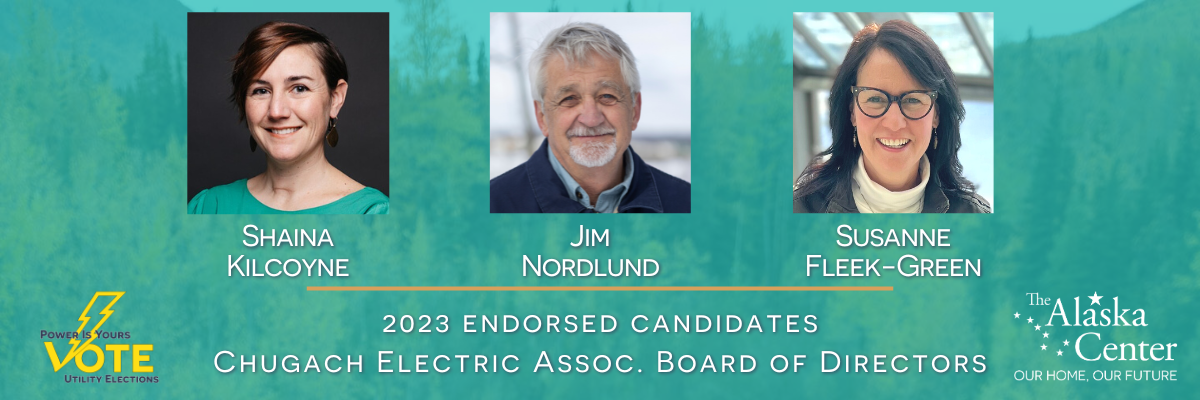Chugach Electric’s annual board of directors election has attracted a larger field than normal: Nine candidates are vying for three open board seats. With a heavy reliance on natural gas to generate power and a projected Cook Inlet natural gas shortfall looming, those elected to the board will help shape the future of Alaska’s largest electric utility, and Southcentral Alaska, in the process.
Chugach is a member-owned cooperative guided by a seven-member board elected by and from its more than 90,000 members from Southcentral communities, including Anchorage, Girdwood, Tyonek, Whittier, Cooper Landing and Moose Pass. Chugiak and Eagle River are not within Chugach Electric’s service area. The board sets utility policy, establishes priorities and provides direction to Chugach’s CEO, Arthur Miller. Directors are elected to staggered four-year terms each spring.
Much of the current board helped navigate Chugach’s nearly $1-billion-dollar acquisition of Municipal Light & Power, and also were responsible for a CEO search that resulted in a lawsuit settlement and attracted scrutiny for its use of executive sessions.
Additionally, the board set goals to reduce Chugach’s carbon footprint by at least 35% by 2030 and at least 50% by 2040, using 2012 as the baseline year. The goals come with the caveat that they can’t have a material negative impact on rates. The utility’s current annual energy mix is about 82% natural gas, 15% hydro and 3% wind, plus just 0.1% solar purchased back from members.
The slate of candidates running for four-year terms includes:
- Brad Authier, a semi-retired engineer who works for SAC LLC
- Bettina Chastain, a self-employed engineering consultant currently serving as board chair
- Susanne Fleek-Green, a National Park Service superintendent
- Harold Hollis, a retired engineer currently serving as board treasurer
- Shaina Kilcoyne, an energy and climate program director for the Alaska Venture Fund
- Steve Konkel, a self-employed environmental health sciences and public policy consultant
- Jim Nordlund, a former state legislator and retired nonprofit executive
- Scott Von Gemmingen, an auditor with the State of Alaska
- James Wileman, a self-employed financial services consultant
The Alaska Center, a 501(c)3 non-profit focused on clean energy, clean water and democracy, has endorsed three candidates – Fleek-Green, Kilcoyne and Nordlund – as “pro-renewable energy and respected community leaders” who “will keep us on the right path for a clean, sustainable future.”
Power the Future Alaska, whose mission is to offer “truth, facts, and research that will enrich the national conversation on energy,” published an opinion piece taking aim at the Alaska Center-endorsed candidates to the conservative blog Must Read Alaska. Power The Future Alaska, a conservative oil and gas advocacy nonprofit with ties to the Koch brothers, is promoting oil-and-gas-friendly candidates. Director Rick Whitbeck wrote a recent blog post claiming “everyone’s favorite group of left-wing (nut) warriors is trying to shove radical candidates” onto the board.
Chastain, the current board chair, took to the Anchorage Daily News with an opinion piece co-authored by CEO Miller headlined “Anchorage’s electric utility is making progress on its clean-energy goals.” The piece is largely self-congratulatory and omits the disclosure that Chastain is running for reelection.
Chugach’s last significant renewable project was the Fire Island Wind farm, which came online in 2012. Chastain and Miller’s piece does mention two proposed utility-scale projects — one wind, one solar — that are currently being studied for feasibility, as well as the purchase of a Tesla Megapack battery energy storage system to be installed in 2024
In candidate statements posted on the Chugach website, all candidates mention either renewable energy, diversifying generation and clean energy. The Alaska Center-endorsed trio is more aggressive regarding renewable energy, while incumbents Chastain and Hollis are the only two to use the term “clean energy.” There is debate on the definitions of clean energy vs. renewable energy, such as whether clean energy includes sources that generate environmental side effects besides emissions.
Electronic voting begins April 19, when members of record will receive an email, and closes May 19. In-person voting is available at Chugach’s annual meeting on May 19 at ChangePoint Alaska. Voters will be entered to win a year of free electricity.
Originally published on April 14, 2023 by The Alaska Current.

